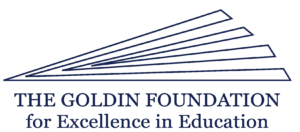
Activities
The Goldin Foundation participates in several “connecting activities” in addition to the selection and recognition of award recipients: Exemplary Projects Awards, Excellence in Education Awards, and Educators Network.
- Goldin Foundation Educators Forum
- Visits to Award Recipients
- Goldin Foundation Seminars
- Goldin Foundation 20th Anniversary Celebrations, Spring 2010
- Educators Network and Professional Development Grants
- Baby Brain Connection: Parenting for Early Childhood Literacy Project
GOLDIN FOUNDATION EDUCATORS FORUMS
Recipients of the Goldin Foundation for Excellence in Education awards are recognized for their outstanding achievements and contributions to their classrooms, schools, and communities at an annual Educators Forum in early April. They share their experiences, projects, and insights with an audience of colleagues, administrators, family, friends, and students. A host school, usually a “home” to one of the recipients, sponsors the event, which includes a Dessert Reception 7:00-7:30, and a Panel Presentation, 7:30-9:00, at which award recipients are introduced by members of the Goldin Foundation Advisory Board and then have opportunity to make presentations to the “community.”
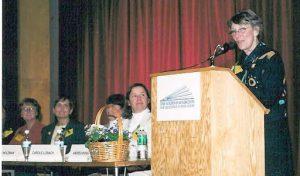 TEC Educators Forum 2002
TEC Educators Forum 2002 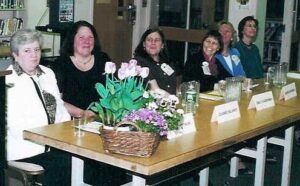 EDCO Educators Forum 2002
EDCO Educators Forum 2002
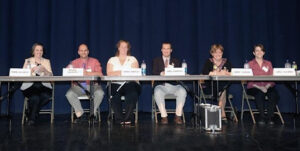 EDCO Educators Forum 2010
EDCO Educators Forum 2010
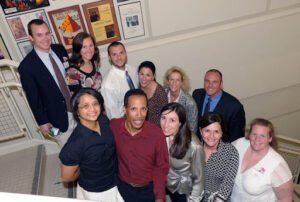 Lincoln Sudbury High School Wellness Team Educators Forum, 2010
Lincoln Sudbury High School Wellness Team Educators Forum, 2010
 Educators Forum, Mountain View CA 2011
Educators Forum, Mountain View CA 2011
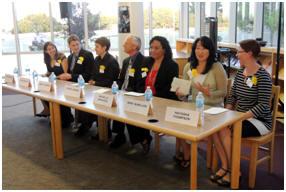 Educators Forum, Saratoga CA 2013
Educators Forum, Saratoga CA 2013
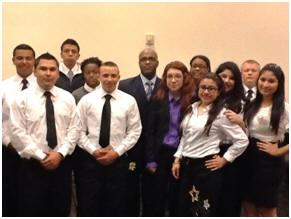 Ken Fisher & his Law Education students, Educators Forum, Galena Park, TX, 2013
Ken Fisher & his Law Education students, Educators Forum, Galena Park, TX, 2013
GOLDIN FOUNDATION SEMINARS
Lead Teachers Group, 1993-2001
Award recipients participated in a Lead Teachers “job-alike” group that encouraged lively discussionabout education practices, issues, and topics of interest. The group sponsored professional development workshops for teachers in specific areas, i.e. ” Planning for Discipline,” “Teaching and Learning Styles,” “Communicating with Parents and Colleagues,” and “AVID Cinema for Classroom Teachers.” They also hosted receptions each Fall for new teachers in order to share “tried and true” advice.
“Resiliency in Adults: the importance that mindset, resiliency and stress hardiness have in our personal and professional lives and their impact on the children and adults with whom we interact”, December 4, 2003
The Goldin Foundation for Excellence in Education invites you to a special symposium. Date: Thursday, December 4, 2003, Time: 4-7 P.M. (A light dinner will be served) Place: Bennet-Hemenway School , Natick. Speaker: Dr. Robert Brooks, a well known psychologist and nationally recognized speaker, author, and television commentator, will speak on a this timely topic.
The Goldin Foundation wishes to further its goals by encouraging its award recipients, both active and retired, to network with each other and provide connections with other educators. We will have a short discussion about how interested award recipients might link with other school systems to offer professional development and with local colleges of education and their future teachers. We welcome your thoughts and look forward to your participation.
This symposium marks the first of future regional events that the Goldin Foundation will sponsor as part of its Educators Network. With the help of our Advisory Boards, we have come up with several ways to enhance the goals of the Foundation as well as to continue making connections beyond the award presentations. Clearly we have an amazing group of educators, both active and retired, who can continue to communicate with each other as well as share their expertise with others. Two of the Foundation’s goals are to support the retention of quality educators and to support efforts to attract and inspire creative, motivated, intelligent people to our profession.
Leadership Seminar: Enhancing Consultation and Presentation Skills, May 4, 2004
As part of its Educators Network, the Goldin Foundation host a Leadership Seminar, Enhancing Consultation and Presentation Skills on May 4, 3:30-5:30 at the Eliot School in Needham.
Dr. N. Jerome Goldberg, a well known consultant at Teachers 21, will be leading the workshop. Jerry is a Goldin Foundation award recipient, and he also was a Superintendent and Assistant Superintendent. in Natick, MA.
GOLDIN FOUNDATION 20th ANNIVERSARY CELEBRATIONS
Spring, 2010
Past award recipients of the Goldin Foundati0n for Excellence in Education were re-honored at the annual Goldin Foundation Educators Forums held in Massachusetts, Texas, and California.
The four events provided wonderful opportunities for Educators of Excellence to re-connect with one another at the dinners and regional events. Harriet Goldin introduced her new book written in honor of the 20th anniversary and give copies to all award recipients. “Above and Beyond: Excellence in Education is an inspiring reminder of the power of teaching and the unlimited creative ideas available to all teachers. We meet more than twenty men and women, impassioned and dedicated educators who share with us the projects and directions that have not only motivated and increased the learning capacity of their students, but have sent energy beyond the classroom and into the community.” (back cover)
 EDCO celebration in Sudbury, MA
EDCO celebration in Sudbury, MA
GOLDIN FOUNDATION EDUCATORS NETWORK*
The Goldin Foundation for Excellence Education recognizes and rewards educators who have made outstanding contributions in their classrooms, schools, and communities. Since its inception in 1990, the Foundation has sought to foster the respect for and appreciation of educators.
The following Goldin Foundation award recipients are available for consultation and professional development with other educators and school districts. They may also be available for seminars, meetings, and/or discussions with college students pursuing careers in education. Any consulting or professional development fees are arranged directly by the participant and host. Some professional development grants are available each year for participating school districts.
To contact a Goldin Foundation Excellence in Education award recipient, you may directly email, write, or call the educator; or you may email the Goldin Foundation: harriet.k.goldin@gmail.com
*Please click on “Educators Network” link on the sidebar for a listing of the educators and their profiles.
Grants for Professional Development (for member school districts)
Sharing best practices is a good and natural consequence of recognizing educators for “excellence in education.” The Goldin Foundation will continue to fund professional development workshops and/or consultation by participating Goldin Foundation award recipients, “consultants,” to member school districts. These educators have been recognized by their peers for their best practices and outstanding contributions in their classrooms, schools, and communities. Each is listed in the updated Educators Network, a cross referenced listing by subject area of award recipients and their projects. See “Educators Network.”
This non-competitive opportunity on a first-come, first-served basis, maximum of one per school system, for 2014-15. A school district can shape the opportunity to meet its needs, for example: teacher workshop, consultation with department chairs, model lesson. It will make direct arrangements with the consultant: date, time, place, and fee. (Information for contacting him/her is on the Educators Network. A school district will apply for the grant and learn quickly about its acceptance (determined only by the order in which it is received). The school district will pay the consultant, submit an evaluation of the program to and receive reimbursement from the Goldin Foundation.
A. At least 15 of these local professional development/consultation grants (within a state) will be provided, each of which cover:
1) cost for the consultant’s fee and travel up to $500 to the receiving school district
2) substitute fee of up to $100 to the sending school district (to relieve an award recipient still teaching) if the workshop/consultation is held during the school day.
B. At least 2 of these local professional development/consultation opportunities (inter- state) could be provided, each of which cover:
1) cost for the consultant’s fee and travel up to $1000 to the receiving school district
2) substitute fee of up to $200 to the sending school district (to relieve an award recipient still teaching).
If a school district does not use the maximum amount of funds, the funds will be extended to create additional professional development grants.
It is suggested that Assistant Superintendents for Curriculum & Instruction/Professional Development share this information with principals as they may have interest in some of the excellent projects being done in schools.
Professional Development Grant Process
1.Review Goldin Foundation Educators Network listing.
2.Contact Goldin Foundation award recipient, who is listed, about providing professional development/consultation in your school system. Discuss potential date/s, time/s fee.
3.Complete “Request for Funding” below and submit to Goldin Foundation to reserve your place (first-come, first-served, maximum of one per school system).
4.Goldin Foundation will notify you shortly by email and letter about your approval, and you will make your own arrangements with the speaker.
5.After the professional development opportunity is completed, forward the evaluation form, which will come with the notification letter. Send the evaluation form to the Goldin Foundation, which will then reimburse your school district.
Professional Development: Request for Funding
Date……………………
School System………………………………
Address……………………………………………………………
Contact Person……………………………………
email……………………………..
Name of Goldin Foundation Educator……………………………
Amount requested (includes workshop/consultation and travel)………………………
maximum of $500 (in state)
maximum of $1000 (out of state)
Send to: Goldin Foundation for Excellence in Education
Harriet Goldin, President
85 Grove Street #408
Wellesley MA 02482

BABY BRAIN CONNECTION
Parenting for Early Childhood Literacy Project
Since 1990, the Goldin Foundation for Excellence in Education has had long experience in recognizing outstanding educators for their outstanding contributions to classrooms, schools, and communities. Collaborating with 85 school districts across the country, Goldin Foundation representatives visit many schools in urban, suburban, and rural areas. Foundation educators are concerned about the continuing needs for enhancing school readiness, increasing academic performance, and bridging the achievement gap. In Spring, 2013, they decided to tackle a project that focuses on early childhood literacy and provide outreach to organizations and individuals working with new and prospective parents, who are less privileged, and the people who support them. The research shows that a baby’s 1st year of life is a time of rapid brain development when interactions of talking, playing, and reading with babies and toddlers are critical. The data on early brain development is so compelling that parents must be provided with encouragement, support , and activities to foster children’s literacy skills long before they enter school. This new emphasis on early childhood literacy development when babies’ brains are developing at a rapid rate might just help change the paradigm for readiness to learn and future achievement.
The Foundation developed a website “Baby Brain Connection: Parenting for Early Childhood Literacy.” For more information, contact by email: goldinfoundation@gmail.com
“We have some different strategies for connecting with parents that are free and can be adapted to introduce and/or complement in-house training within your organization.”
- We have developed a website, free guide, and modeling and coaching support for 1) support people whom we call “Parent Providers ” and 2) new parents that tie in with the latest research on early brain development for infants and toddlers birth-12 months.
- It uses a different approach to hook people’s attention with short video vignettes as a fun and informative training device, user-friendly talking points, and direct strategies taken from many resources.”
Here is a blog that was developed for the ISIS Parenting Group as well as handouts for parent groups, parent providers groups, teachers, and administrators.
Dear Parents,
From the very minute that your precious child is born, you are your baby’s 1st teacher.
Research shows that the 1st year of life is a critical period in helping infants become aware of language. Your baby’s brain is developing rapidly. His brain is making many connections as he learns about his world. Every time you talk, touch, cuddle, rock, sing, or read to him, you are helping his brain develop. Does this surprise you? It’s a fact. Although he may not understand the words, your baby will slowly begin to make connections between words and their meaning.
By the end of the 1st year babies begin to use some words. The time you have spent talking, playing and interacting, and reading to your child will provide a strong foundation for his learning to talk and then learning new words as he grows. These skills will better prepare your child for successful learning in preschool and kindergarten. There is even evidence that talking to babies in the 1st year can help them become better learners throughout grade school and help them in later life too.
How can you, as a parent, best help your baby’s brain development during the 1st year and at the same time develop his literacy? Here are some suggestions developed by child development specialists and then tried and tested by parents to help you and your baby reach their developmental goals. Many more Talking, Playing & Interacting, and Reading activities are found in a free Parents Guide for the 1st Year on the website: www.babybrainconnection.org
Brain Development: Stimulating early experiences lay the foundation for later learning. Through repetition, brain connections become permanent….if a connection isn’t used at all or not often enough, it is not likely to survive
Talking: Talk to your infant about everything you do when you are together. “I am taking you to the kitchen.” “I am changing your diaper.” Talk about what you are doing, what your child is doing and what your child sees….. when you feed, play, dress, bathe, take walks, go to stores, and visit friends. Point out things and name them. Use “Parentese,” a sing-song speech that has a higher pitch, slower tempo, and exaggerated facial expressions. Babies love it; their brains are “mapping” the sounds they are hearing, and talking in a way that gets their attention helps them learn to speak and understand language.
Playing & Interacting Children learn language concepts through play. The “serve and return” interaction between parent and baby – in which 1) young children naturally reach out for interaction through babbling, facial expressions, and gestures and 2) adults respond with the same kind of vocalizing and gesturing back at them – builds and strengthens brain architecture and creates a relationship in which the baby’s experiences are affirmed and new abilities are nurtured.
Begin Reading to children early, and make reading aloud a daily activity. Mother Goose rhymes and songs stimulate language and listening. Select picture books with short sentences and simple illustrations. Choose books about animals, routines (bedtime, getting dressed), or foods. Talk about what you see on each page and don’t worry about following the actual story.
There is nothing here that you can’t do. You are your child’s 1st teacher, and probably the most important. Enjoy teaching your baby — all the learning activities are easy, fun to do, and free!
For more information, contact goldinfoundation@gmail.com
